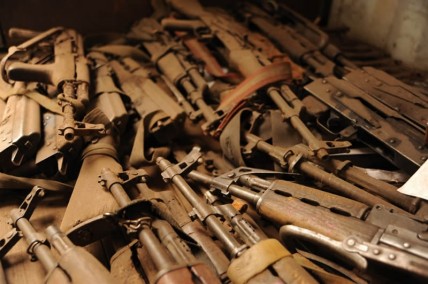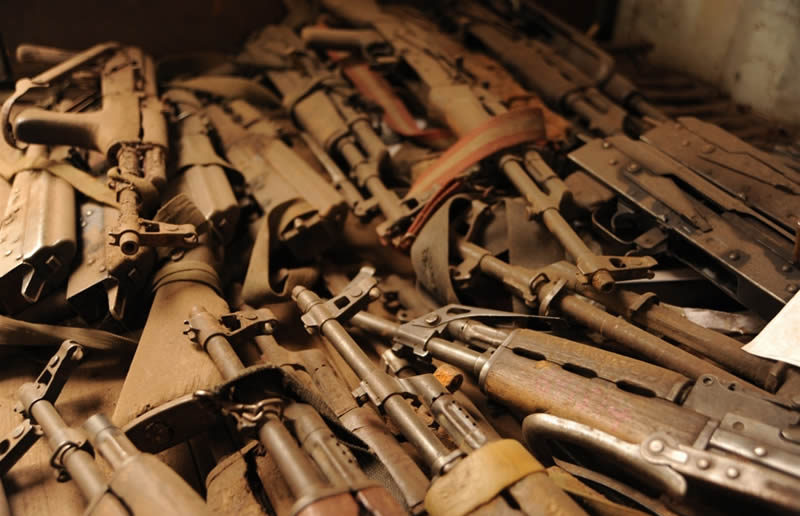
Part of a weapons haul collected in the past couple of months as part of the DDRRR process in the eastern DRC. Photograph by Guy Oliver/IRIN
The failure of a proposed treaty to regulate the multi-billion dollar global conventional weapons trade does not mean disaster, according to some campaigners looking to develop effective international arms controls.
On 27 July, the final day of a month of intense negotiations at the UN in New York, the USA, Russia, Cuba, North Korea and Venezuela declared talks needed to be extended before any agreement could be reached on an Arms Trade Treaty (ATT).
Beatrice Fihn of Reaching Critical Will (RCW) – the global disarmament section of the Geneva-based Women’s International League for Peace and Freedom – told IRIN: “We saw a huge wave of disappointment among governments and NGOs. The countries being blamed [for the failure]are probably feeling huge pressure. But it won’t be another 10 years until there will be a [conventional arms trade]treaty.”
The meeting addressed three overriding issues for a treaty: Scope – to determine which categories of weapons will be included; criteria – establishing a minimum threshold for the transfer of weapons and implementation – covering such mechanisms as the establishment by each potential signatory of transparent and competent regulating authorities.
Governments from 90 participating countries delivered a joint statement after the meeting expressing disappointment and a determination “to secure an ATT as soon as possible – one that will bring about a safer world for the sake of all humanity”.
The silver lining, according to some proponents of a “robust” treaty, was that there is still an opportunity for a legally-binding instrument to regulate the arms trade, and there are “a few options available”, Ray Acheson, project director of RCW, told IRIN.
“The current draft could be taken to the UN General Assembly for a vote, if a member state is willing to propose this. Or, states could propose a stronger draft for vote at the General Assembly. Or, the General Assembly could establish a new negotiating mandate for the ATT, at which point states could work off the current draft text as a basis for negotiations, or they could start from scratch. Or, the matter could be dropped entirely, though this seems unlikely,” she said.
Guy Lamb, primary author of the Institute for Security Studies (ISS) handbook entitled Negotiating an Arms Trade Treaty, A Toolkit for African States, told IRIN: “Where we were and how far we have come is a considerable distance… Before 30 June there was no text whatsoever. By 27 July we had a draft treaty text, about which 90 [UN member] states said `we can live with this and probably more’.”
Ammunition
There was a commitment from the USA, the world’s major arms exporter, to participate in any second round of negotiations, he said, and on the “positive side”, this would provide more time for a stronger focus on ammunition in the treaty; and more consideration of embedding greater international humanitarian and human rights laws within it.
Roy Isbister, head of arms transfers and small arms at Saferworld, an NGO mandated to reduce global armed conflict, told IRIN: “The extra time does give us the opportunity to fix up problems in the treaty… and we may even be able to move ammunition into the `scope’, rather than being a poor relation in [the]`export’ [article].”
Civil society and many participating governments had campaigned for the inclusion of ammunition – seen as the fuel of conflict – within the scope of conventional arms categories in the treaty, but the focus ended up on battle tanks, armoured combat vehicles, large calibre artillery systems, combat aircraft, attack helicopters, warships, missile and missile launchers and small and light weapons.
The proposed ATT also has the backing of the European Union, two permanent members of the Security Council (the UK and France) and Germany.
Allison Pytlak, spokesperson for Control Arms Coalition (CAC), an umbrella NGO campaigning for a conventional ATT, said in a document seen by IRIN: “It was felt that supporting the US aim of a mandate for a new diplomatic conference, or opening discussion on an entirely new text, is a bad idea and too full of uncertainties. The momentum to achieve a treaty in 2012 is very strong and should not be lost.”
Towards a treaty
The path envisaged by CAC would be for sympathetic states to present a resolution at the General Assembly calling for the adoption of the treaty in October 2012 and, if it passes the First Committee, move for a final vote in December 2012, and avoid “the hurdles imposed by consensus”.
RCW’s Fihn said “the [UN] consensus rule was a huge problem”, but it was a choice between a “weak treaty” with more participating countries or a strong agreement with fewer signatories.
The impetus for ATT was provided by a group of Nobel peace laureates led by Óscar Arias in 2003, who became Costa Rica’s president, and a subsequent General Assembly resolution adopted in 2006 to establish “common international standards for the import, export and transfer of conventional arms”. In 2009 the General Assembly began the process framed within the UN approach of “consensus”, with a 2012 deadline.
US stance
The US decision to plead for more time was probably due to a campaign by the politically influential National Rifle Association (NRA) during a presidential election year. The NRA said the sub-text of the ATT was to take away US citizens’ Second Amendment rights guaranteeing individuals the right to bear arms. Analysts have repeatedly pointed out that the proposed ATT would do no such thing, but the more important consideration was whether or not US voters believed NRA’s message.
However, the US delegation’s argument for not supporting the draft treaty was that “any ATT would require the support of the major arms exporters to be effective, and we believe that some major arms exporters would refuse to agree to an ATT that required meaningful, effective conventional arms transfer controls policies. The only way to convince all major arms exporters to sign on to the ATT would be to weaken its provisions…
“A weak ATT would legitimize an international standard based on a lowest common denominator that would not address the problem of illicit and irresponsible arms transfers,” the delegation said.
In recent years weapons conventions adopted outside UN auspices have opted for the path of least resistance. The 1997 Mine Ban Treaty, or Ottawa Treaty – to prohibit the use and stockpiling of anti-personnel mines – entered into force in 1999 after 40 states had ratified it and to date 160 states are party to it. Likewise the Convention on Cluster Munitions – preventing the use, transfer and stockpiling of cluster bombs – entered into force in 2010 after gleaning 30 signatories, and 111 countries are currently party to it.
China, Russia and the USA are party to neither of these conventions. However, Fihn said the conventions had “created an international norm” and had had a “huge effect in terms of international law”, and even those countries that were not signatories often abide by their terms.
The ISS’s Lamb said such conventions to prohibit the use of indiscriminate weapons were negotiated by “likeminded states” and much easier to achieve. The UN system was about reaching agreement through consensus, and the issue of access to conventional weapons also falls within the ambit of a nation’s right to self-defence, “and then add economic interests to it – it’s far more complex” than recent weapons conventions.
“Loopholes”
“The current draft text is not acceptable, in my view. It still contains significant loopholes that would have undermined its ability to truly diminish human suffering as a result of the irresponsible arms trade,” Acheson said.
Among her concerns were a lack transparency on reporting and record-keeping which no longer had to be made public; that arms exporting states could continue to transfer weapons to governments responsible for committing human rights violations; insufficient regulation of arms brokers; and that there was no provision for victims’ assistance.
However, Isbister of Saferworld said once a treaty was adopted it was not set in stone and there was provision to “tinker” with it as it had to be current “to keep pace with [military]technology [advances].”
Robert Zuber of the NGO Global Action to Prevent War, in a post-mortem of the ATT process, said civil society’s “lack of interest” in UN processes “was troublesome”, and as the ATT negotiations were hosted by the UN “it should have occasioned more interest in the institution.”




